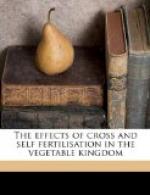elements seems indispensable for the full fertility
of the parents, and for the full vigour of the offspring.
All the individuals of the same species, even those
produced in a state of nature, differ somewhat, though
often very slightly, from one another in external
characters and probably in constitution. This
obviously holds good between the varieties of the
same species, as far as external characters are concerned;
and much evidence could be advanced with respect to
their generally differing somewhat in constitution.
There can hardly be a doubt that the differences of
all kinds between the individuals and varieties of
the same species depend largely, and as I believe
exclusively, on their progenitors having been subjected
to different conditions; though the conditions to
which the individuals of the same species are exposed
in a state of nature often falsely appear to us the
same. For instance, the individuals growing together
are necessarily exposed to the same climate, and they
seem to us at first sight to be subjected to identically
the same conditions; but this can hardly be the case,
except under the unusual contingency of each individual
being surrounded by other kinds of plants in exactly
the same proportional numbers. For the surrounding
plants absorb different amounts of various substances
from the soil, and thus greatly affect the nourishment
and even the life of the individuals of any particular
species. These will also be shaded and otherwise
affected by the nature of the surrounding plants.
Moreover, seeds often lie dormant in the ground, and
those which germinate during any one year will often
have been matured during very different seasons.
Seeds are widely dispersed by various means, and some
will occasionally be brought from distant stations,
where their parents have grown under somewhat different
conditions, and the plants produced from such seeds
will intercross with the old residents, thus mingling
their constitutional peculiarities in all sorts of
proportions.
Plants when first subjected to culture, even in their
native country, cannot fail to be exposed to greatly
changed conditions of life, more especially from growing
in cleared ground, and from not having to compete
with many or any surrounding plants. They are
thus enabled to absorb whatever they require which
the soil may contain. Fresh seeds are often brought
from distant gardens, where the parent-plants have
been subjected to different conditions. Cultivated
plants like those in a state of nature frequently
intercross, and will thus mingle their constitutional
peculiarities. On the other hand, as long as the
individuals of any species are cultivated in the same
garden, they will apparently be subjected to more
uniform conditions than plants in a state of nature,
as the individuals have not to compete with various
surrounding species. The seeds sown at the same
time in a garden have generally been matured during
the same season and in the same place; and in this
respect they differ much from the seeds sown by the
hand of nature. Some exotic plants are not frequented
by the native insects in their new home, and therefore
are not intercrossed; and this appears to be a highly
important factor in the individuals acquiring uniformity
of constitution.




